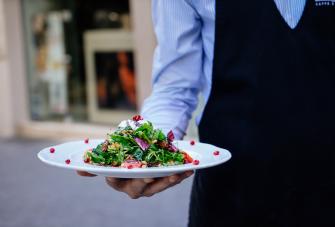How to Value a Restaurant
Almost every restaurant owner should have some understanding of what their business is worth for a variety of reasons.
In this article, we show you how to accurately value your restaurant and explain why it matters.
Why Value Your Restaurant?
Although not the most pressing issue restaurant owners worry about, valuing your restaurant is important and you should always aim to have a close estimate figure.
There are several important reasons you might need to have a valuation done, including:
- Selling your business
- Seeking investors/additional financing
- Divorce or estate proceedings
- Preparing updated/corrected tax returns [1]
If you’re preparing to sell your restaurant, you’ll want to prepare a figure which is fair for both yourself, the seller, and the buyer. Having a current valuation is an essential starting point.
If you aren’t planning to sell, you might want to have a valuation done so you know whether or not you’re overpaying your business taxes.
You may be expanding your restaurant to new locations and are seeking investment or additional financing to move forward. If you’re unable to accurately value your restaurant, it may prove difficult to get the financial backing you need.
A business valuation is needed for both divorce proceedings and estate proceedings. It’s far better to have a valuation prepared, rather than wait until it is absolutely necessary, and can have the pressure of completing a valuation add stress to an already difficult period.
Profit and Value
High profit alone doesn’t mean your business is valuable. Value includes both your tangible and intangible assets, which could include things like:
- Fixtures, equipment, and furnishings
- Whether you own the building/land or lease
- How long you’ve operated the restaurant
- Whether or not you have a large base of loyal customers
- The condition of your premises, and other buildings in the area
- Location; whether you trade in a prime location [2]
You’ll also need to think about the condition of your fixtures and equipment, including the furnishings. Are your tables and chairs in good condition, or are they battered from years of use? Does the kitchen equipment work consistently and well? What kind of maintenance programs do you have in place for your refrigerators and freezers?
You’ll also want to be sure that you’re keeping the building in good repair, including the plumbing, electrical, and HVAC systems (heating, ventilation, and air conditioning).
You could be earning more profits than you’ve ever dreamed of, but if your building is run down, your equipment is old and doesn’t work properly, or you’re barely getting customers in the door, your business may not be as valuable as you hope.
As a restaurant owner, it’s important for you to understand valuation methods so you can properly value your business.
Valuation Methods
There are many ways of valuing a restaurant [3], and you’ll need to determine which method is best for yours. We list a few of the most common restaurant valuation methods below.
Income Valuation
The income valuation method looks solely at how much income your restaurant generates on an annual basis. If your restaurant’s income has fluctuated wildly over the past several years, this may not be the right method for you to use.
Generally, you’ll want to sell your restaurant for 25-40 percent of your annual income [4], but relying on percentages alone isn’t always reliable since there are a number of factors that influence a valuation.
This valuation method should probably be used in combination with one of the other methods highlighted below for a more comprehensive valuation of your restaurant.
Market Valuation
This valuation method is typically used when you’re ready to think about selling a restaurant.
Market valuation directly compares your restaurant to similar restaurants in your area, looking specifically at what buyers are willing to pay for those businesses in the current market [5].
In order to properly calculate your restaurant’s value using the market valuation method, you’ll need to be sure you’re choosing restaurants that are similar enough to yours to provide a true comparison. Look at a wide variety of restaurants for a more accurate figure.
Because the restaurant industry is a highly competitive market if you can show that you’re doing as well as, or better than, your competitors, you’re more likely to receive a higher offer from potential buyers.
Asset Valuation
This valuation method uses a simple formula to determine your restaurant’s value.
You first calculate the value of all of your assets. Then you calculate the value of all of your liabilities. Once you have those two totals, you subtract your total liabilities from your total assets and arrive at your restaurant’s value [6].
Be aware that this method tends to calculate the lowest possible valuation when compared to the other methods, and is most often used when a restaurant is going out of business or has already closed and needs to be sold off.
In these situations, the buyer is often just paying for the real estate the restaurant sits on rather than going by the value of the restaurant itself.
Seller’s Discretionary Earnings
Typically, this method would be used for restaurants with less than US $5,000,000 (around NZ$7 million) in annual revenue and is considered by some to be another form of income valuation [7].
Seller’s discretionary earnings are just another way to say adjusted cash flow or total owner’s benefit.
Basically, this valuation method is based on how much a single full-time owner/operator would earn annually from their restaurant [8] and is fairly easy for restaurant owners to calculate.
“Discretionary earnings” refers to any funds earned from the business that an owner uses for:
- Personal meals and entertainment
- Life insurance
- Health insurance
- Memberships in social (not business) clubs or organizations
- Personal travel, including vacations
- Personal vehicles
In order to qualify as “discretionary” under this valuation method, the earnings must be used solely for the owner’s benefit and paid for from business earnings.
If you’re unsure which valuation method is right for your restaurant, you may want to consult with a valuation professional, who can help you sort through the various valuation methods available to you and help you choose the best one for your business.
While it may be easy to focus solely on your physical assets during a restaurant valuation, you don’t want to forget about the value your software and other systems add to a restaurant, especially your point of sale system.
A Value-Added POS System
One of the most important, but often forgotten, parts of a restaurant valuation is the point of sale (POS) system already in place. Your POS system can also play a critical role in simplifying the valuation process since it calculates your revenue and liabilities in real-time.
Staff salaries and holiday entitlements are also trackable through Epos Now’s POS systems, meaning that asset and discretionary valuations require a lot less calculation.
Reports on other assets, such as inventory, are also available through the Hospitality Epos System. This software provides a wide range of reporting options so you can track productivity and sales, among other available metrics.
If you own a restaurant or work in hospitality, you may also want to read:
A Recipe for Growth: Restaurant Digital Marketing Strategies




